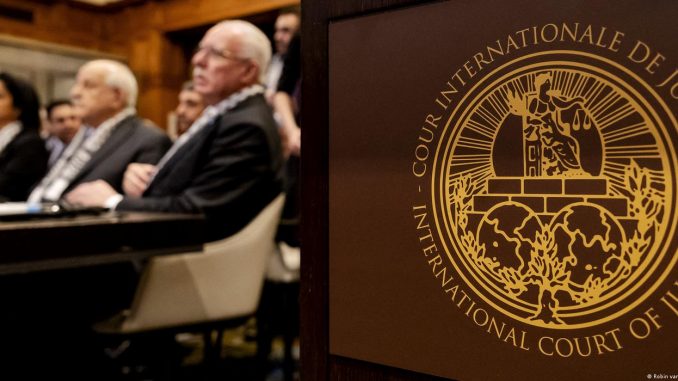
Nicaragua has brought a case before the International Court of Justice in The Hague aiming to end Germany’s ongoing support for Israel, claiming it violates the Genocide Convention. The outcome is likely to be historic.
The Convention on the Prevention and Punishment of the Crime of Genocide, commonly known as the Genocide Convention, is one of many pieces of international law created in response to the worst genocide of the 20th century.
Under the auspices of the newly formed United Nations, the 1948 treaty aims to make good on “never again,” a refrain that arose from Germany’s systematic extermination of 6 million European Jews and millions of others during the Holocaust.
By laying out a legal framework for “genocide,” the convention hopes to prevent another one — although a number of large-scale war crimes have taken place around the world in the decades since. Germany and Israel are two of more than 150 countries party to the convention, along with the small Central American country of Nicaragua. That means each signatory has the legal responsibility to uphold the convention’s provisions and reserves the right to formally accuse another of violating them.
That’s what Nicaragua has done. On March 1, it initiated proceedings against Germany at the International Court of Justice (ICJ) in The Hague. The filing alleges that Germany, due to its steadfast support for Israel including weapons deliveries, has “failed to fulfill its obligation to prevent the genocide committed and being committed against the Palestinian people” and thus has “contributed to the commission of genocide in violation of the Convention” and other elements of international law.
The proceedings request that the court implements “provisional measures” against Germany, which could call for a suspension of its support for Israel, “in particular its military assistance including military equipment, in sor (sic) far as this aid may be used in the violation of the Genocide Convention.”
Defining ‘genocide’ a matter of legal opinion
In the wake of the October 7 attacks by Hamas — categorized as a terrorist group by the US, the EU and other governments — which Israeli officials say killed about 1,200 people including at least 850 civilians, Israel has bombarded and besieged the Gaza Strip. The resulting death toll has exceeded 32,000 people, or more than 1.5% of the population, according to the Hamas-run Health Authority. Many thousands more are missing. Some aid organizations have said the figure could be an undercount.
The United Nations and human rights groups have accused Israeli forces of indiscriminate attacks against civilians. Even staunch allies of Israel, such as the United States, have called the civilian death toll too high.
Whether Israel’s actions amount to “genocide” is a matter of legal opinion. In a January ruling of a South African case against Israel, the ICJ found “at least some of the acts and omissions alleged by South Africa to have been committed by Israel in Gaza appear to be capable of falling within the provisions of the Convention.”
Courtesy of DW